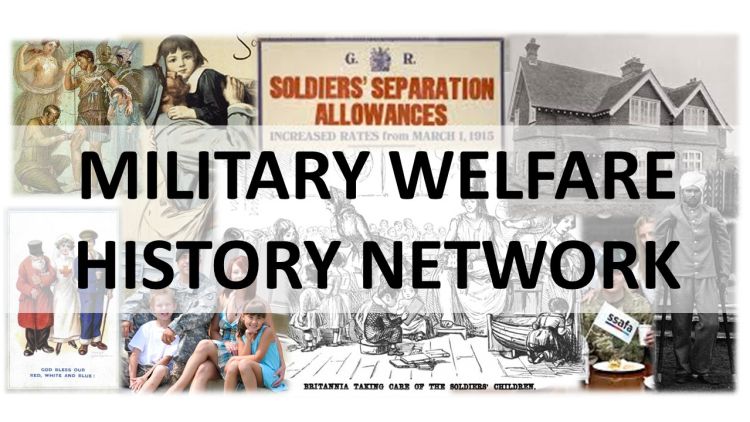Conference: Military Welfare History Network, 2024

- Date: Friday 21 June 2024, 08:30 – 17:30
- Location: Michael Sadler Grant Room (3.11)
- Type: Conferences
- Cost: Free to attend conference; £25 to attend conference dinner (optional). Registration required.
The theme of the third annual international conference of the Military Welfare History Network (MWHN) will be 'Economies of Military Welfare: Conversations between Past and Present'.
The welfare of soldiers and their families, both provision and neglect, is a theme relevant to wars throughout history. Understanding the role of economies – financial, emotional and social – in the success or failure of past military welfare systems is crucial for identifying how societies can structure and improve these systems today.
Keynote addresses
The conference features two keynote addresses.
First keynote address
The first keynote address will be given by Professor Julie Anderson (University of Kent): 'Immaterial Welfare: Disabled veterans and the emotional economy in the First and Second World Wars'.
Please note: the keynote will take place on Thursday 20 June 2024 (the day before the main conference). This keynote address is open to all, but registration is required.
If you register for the whole conference, you do not need to complete a second registration for this keynote lecture. See below for details on how to register for the whole conference.
Second keynote address
The second keynote address will be given by Dr Stephanie Wright (Lancaster University): ‘Dis/economies of welfare: war, disability and Francoist veterans of the Spanish Civil War’. Read the abstract in the conference programme, below.
Please note: this keynote address is only open to conference delegates.
Provisional programme
08:30: Arrival and welcome
09:00-10:30: Panel One. ‘Private Welfare and Philanthropy’.
‘The Welfare of the Defeated: Public initiatives for the care of German POWs in Britain, 1945-48’, Dr Alan Malpass (Bishop Grosseteste University)
“Contributing liberally of his vast means’: Thomas Lipton, the Erin and War Relief, 1914-15’. Dr Gavin Wilk
‘The ‘Special Burden’ of Civilians? Bombardment Compensation and Insurance in Coastal England during and after the First World War', Dr Michael Reeve (The Open University)
10:30-11:00 Break for refreshments
11:00-12:30: Panel Two. ‘Empires and Aftermaths’
‘Rethinking the French Model of Military Welfare from the Colonies’, Dr Dónal Hasset (University College Cork)
‘”The Prisoners of War themselves will never be able to forget that their morally well-founded and economically achievable wishes were not better met”: The failure of state-based welfare for returning Prisoners of War in the First Austrian Republic’, Louise Earnshaw(University of Leeds)
‘Counterinsurgency and Culture: The British Army in Helmand, 2006-11’, Simon Olson (Manchester Metropolitan University)
12:30-13:30 Break for lunch
13:30-14:30: Keynote Address. ‘Dis/economies of Welfare: War, disability and Francoist veterans of the Spanish Civil War’ by Dr Stephanie Wright (Lancaster University).
Abstract
This keynote will explore 'economies of welfare' through the case of the Francoist war disabled of the Spanish Civil War. The Francoist regime (1939-75) congratulated itself on having solved its war disability 'problem' at a fraction of the costs incurred by participants in the First World War. Indeed, compared to cohorts of disabled veterans in other contexts, the Francoist war disabled seemed relatively contented with the support they received, with some becoming some of the dictatorship's most enduring supporters. Yet these economies came at a price, a price borne by those who did not fit the regime's idealised vision of what it termed the 'Mutilated Gentleman'. This paper will explore the political, cultural and social economies of war disability throughout the Francoist dictatorship and into Spain's transition to democracy.
About the speaker
Dr Stephanie Wright is a historian of modern Spain, specialising in the histories of disability, psychiatry, sexuality, and gender under the Francoist dictatorship. She is currently writing a book on the experiences of maimed Francoist veterans of the Spanish Civil War, while starting a new research project exploring sexual violence under Francoism. The latter centres on the role of forensic doctors and psychiatrists within court cases dealing with sexual crimes in twentieth-century Spain. She has published extensively on the history of war disability, including ‘Pride and Privilege? New Approaches to War Disability in the Twentieth Century’ with Sebastian Schlund, published in History, and ‘Of Maiming and Privilege: Rethinking War Disability through the Case of Francoist Spain, 1936–1989’ in Past & Present, both in 2022.
14:30-14:45 Break
14:45-15:45: Panel Three. ‘Families’
‘Welfare for German soldiers and their families after World War I’, Katherine Quinlan-Flatter
‘From Military Medicine to Health?: The Challenge of Soldier’s Welfare in the Wartime Canadian Army, 1939-1945’, Dr Geoffrey Hayes (University of Waterloo)
15:45-16:00 Break for refreshments
16:00-17:30: Panel Four, ‘Women’
‘War Brides and the Australian Repatriation System: The Case of Patricia Maureen McPherson’, Charles Hewat (University of Sydney)
‘“The Gaping Hole”’: A case study analysis in post WW1 welfare of NZ Army Nursing Sisters’, Dr Wendy Maddocks (Canterbury Christ Church University)
‘Becoming Soldiers: Post-Spousal Death and Battle Careers of Women in Boko Haram affected military households in Nigeria’, Dr Nicholas Idris (Nigerian Institute of International Affairs)
Conference dinner
The conference dinner will take place on Thursday 20 June 2024 (before the day of the conference). If you would like to attend the dinner, please select this options as part of your registration.
Registration
Please register via the University of Leeds Online Store.
Registration for Dr Julie Anderson’s keynote lecture only (not the whole conference): Free
Queries
Please direct all queries by email to militarywelfarehistory@gmail.com.
About the Military Welfare History Network
The MWHN provides a networking and dissemination platform for scholars who are active in military welfare history. The network seeks to bring together scholars in this unique yet diverse area of research to promote their research, expand their networks and develop collaborations. Find out more on the MWHN website.
Image credit
Courtesy and copyright of the Military Welfare History Network.

